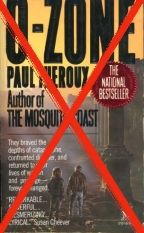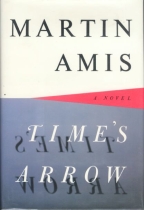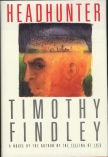 |
|
This literary author's excursion into science fiction shows up 59th in an Amazon.com list of his novels. I am forced to confess I had the paperback out in the garage. |
|
|
|
Non-Genre Writers Have a Go At Scaring the Crap Out of Readers
The Agony Column for June 7, 2002
Commentary by Rick Kleffel
 |
|
This literary author's excursion into science fiction shows up 59th in an Amazon.com list of his novels. I am forced to confess I had the paperback out in the garage. |
Writers of litrachur dabble in genre fiction at their own risk. But nothing has been able to stop them.
Not bad reviews, not being completely ignored by the massive readership they presumably are seeking. Every year, somebody else wants to prove "Oh, I could do that!"
Maybe it's not that craven. Sometimes litrary writers find they've wandered into a genre just doing whatever it is that they feel like doing. It's not always a failure. In fact, sometimes it's a smashing success.
I'm presuming that the reader of this column, like me, is not interested in wasting their valuable reading time on bad books. So I'll skip over the failures, thankyouverymuch. As it happens, discussing successes is far more interesting than badmouthing flops. Well, it is if the works in question are Martin Amis' 'Time's Arrow', Anne Arensburg's 'The Incubus' and Timothy Findley's 'Headhunter'. Now I know that there are other litrary authors out there who have done the horror thing (or the science fiction thing, or the mystery thing) and done it well. So I'll admit both the gaps in my reading and the gaps in my review database. I'm moving to correct what I can and build on what I have.
 |
|
Martin Amis reverses the neutron flow in 'Time's Arrow, a remarkably successful genre-like litrary novel. |
Say what one might about litrary authors and genre, 'Time's Arrow' could certainly only result from an attempt to create 'Time's Arrow'. To heap up extra layers of self-contradiction, I can add that 'Time's Arrow' is perhaps more closely related to science fiction than horror. Still, any successful novel about the Holocaust is going to evoke many of the emotions of the finest horror. And 'Time's Arrow' is nothing if not a timeless success. It's also a novel about the Holocaust that avoids pretense and bathos, the two anchors that often weigh down fictional attempts to come to terms with this attempted genocide. There's a simple twist that's so ingenious, one wonders why no genre author thought of it first. Tod T. Friendly, once a Nazi surgeon at Auschwitz is inhabited by a doppelganger, a spirit within who experiences Tod's life backwards, from death to birth. A life turned upside-up; a holocaust converted into a resurrection. It's at once thought provoking and horrific.
Amis' twist keeps the horror at arm's length, so the reader is able to digest it intellectually and not be overwhelmed by the emotions it evokes. The narrator's naiveté infects the reader, who certainly begins to see the ordinary things of life -- eating, for example, -- in a different light. Like the best genre authors, Amis enlarges the reader's perspective. But he's also a fine writer, so there's no feeling of being lectured to. His prose is transparent, lucid, a lovely lamp illuminating an easily read-page. The book slips by so fast, most readers will finish as if it were today's best selling page-turner. It fits the genre conventions perfectly, and Amis' sense of humor is a blessing. I've quoted a wonderful passage from the novel in the linked review. It alone sold me on the novel. Once I bought it, there was no going back. Or I was always going back, or...I was changed by a great bit of writing.
 |
|
Those who enjoy Fortean fiction and quiet horror should read this wonderfully dense supernatural story. It's almost int he re-read pile just from my recent examination. |
Readers who approach 'Incubus' expecting something like Stephen King or Dean R. Koontz might as well (to paraphrase a net wag) 'Burn their money -- it's cheaper and more fun.' But Arensburg's experiment is one of the more successful attempts at literary horror. If you set your expectations correctly. 'Incubus' is not a page-turning tale of pulse-pounding terror. Back in the 1980's it would have been called quiet horror, and that label will serve nicely enough today. It's character driven, intricate and extremely well researched. It's also a rather unusual entry in the lexicon of horror. This is a horror novel told by a middle-aged housewife in a small American town. It's a woman's novel told from a rather ordinary woman's point-of-view.
Set in 1974, 'Incubus' is told by Cora Whitman, married to Minister Harry Lieber, who is the minister of Dry Falls. The narrative presents itself as a record of the strange events of 1974, a year when the town was struck by a drought. From the first page, it gathers both momentum and veracity from the speaker's voice and the instant identification of the aforementioned events as "Fortean" phenomena. The characters know they're in a ghost story. They're not stupid, but some events just cannot be explained away. And yet these events take place between the most mundane tasks of everyday life; cooking, cleaning, taking care of the kids.
The epigraph for the novel includes a quote from Charles Fort, author of 'Book of the Damned', and arguably one of the first investigators of the paranormal. This ensures that we get reports of the red rain, the disturbances in the sky along with the psychosexual longings of the stultified middle class. The novel is not fast food or fast reading; it's a complex stew of ingredients that gradually add up to a complex, fascinating flavor.
Arensburg excels at accumulating a combination of normal and weird minutiae. Odd shadows, bad dreams, strange behavior from the pets and cakes that fall in an untouched oven come together to paint a picture of a town under invasion from another dimension. It's an unhysterical version of Keel's 'The Mothman Prophecies'. The entity -- or entities -- attempting to push into our world are ultimately unknowable, but in attempting to understand them, the characters come to a greater understanding of themselves, and the limits of what they can know, both of themselves and of the world around them.
Don't expect car chases, horrific violence or even a tense feeling of terror. Instead look for a slowly evolving understanding that something else exists beyond one's self. It may be human or it may be far beyond our ken, but it's out there, and Arensburg craftily shows us just what can expect to happen if we're forced to confront it. The novel is a wonderful combination of supernatural terror and mundane reality, rendered by a non-genre author with an authority bolstered by solid research. In retrospect, it's not surprising that a litrary approach to horror would result in a novel of quiet horror. The expectation is met and nicely exceeded. If quiet horror is your interest, then you owe it to yourself to look for 'Incubus'.
 |
|
If Coppola can re-write Conrad, why can't Canadian author Timothy Findley? The bird-borne disease featured in this novel was conceived of before the recent scares from New York. |
Timothy Findley's 'Headhunter' was a novel I was actually asked to review. Otherwise, I can assure readers that I wouldn't ever have heard of it either. 'Headhunter' re-tells the story of Conrad's 'Heart of Darkness', now reset to a psychiatric institute in Toronto. Kurtz is the master-psych who has gone native in the wilds of insanity and made a killing in the public eye. All this really gives Findley and place, a time and a way to quickly break down reality into a series of what seem to be interlocking nightmares. Live pornography, characters escaping from the pages of novels, and a mysterious bird-borne disease are all symptoms of a greater illness -- a contagious insanity.
Like Arensburg, Findley tends towards the dense and detailed as opposed the tension-packed chase scene. The monsters here are mostly monsters of the soul, but that makes them no less surreal and no less supernatural. In many ways, it makes them much more threatening. If you can stand the sort of balancing act that Findley pursues -- and yes, some readers like the supernatural black and white, good and evil -- then 'Headhunter' is definitely worth seeking out. Alas, it's not easy to find, as it's no longer in print. In fact, excavating this review has lead to some quick investigation, and I find that Findley is the author of a novel from a couple of years ago that sounded intriguing but never made it into my in basket -- 'Pilgrim', about a man who is committed for attempted suicide. Turns out he may not be able to die, and may have lived a number of lives.
 |
|
I've been told by trusted friends to seek professional help. |
That's why one should poke about in one's own archives, and look for the edges of the genres that one loves. There's a lot of great work out there, waiting to be read, books that don't require a foil-encrusted cover and blurbs that include the word "RIVETING!"
If I want riveting, I'll go ask my local surgeon for trepanation. If books can't relieve the tiny brain of stress, a drill bit probably can.
Thanks,
Rick Kleffel